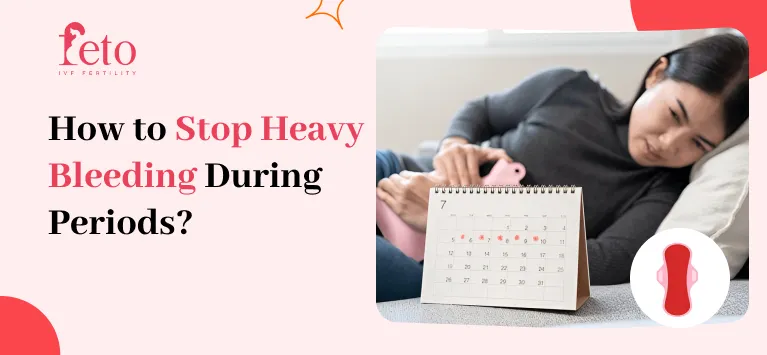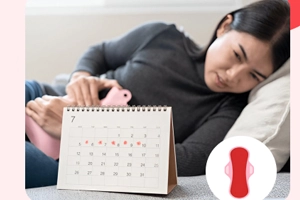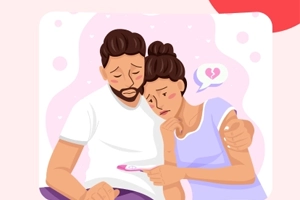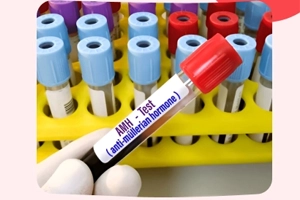
How to Stop Heavy Bleeding During Periods?
Key Facts
- Heavy bleeding affects up to one in three women during their lifetime.
- Loss of more than 80 ml of blood per cycle is considered heavy.
- Untreated heavy bleeding can lead to iron-deficiency anemia.
- Many causes are treatable with non-surgical methods.
Heavy menstrual bleeding, medically referred to as menorrhagia, is a condition that affects many women during their reproductive years.
While occasional changes in flow are common, excessive bleeding can disrupt daily activities, cause fatigue, and sometimes indicate an underlying health concern.
Understanding the causes, tracking symptoms, and knowing when to seek medical care can help manage heavy periods effectively. Let’s give you evidence-based solutions ranging from simple lifestyle adjustments to medical treatments.
Monitoring Your Flow
The first step in managing heavy bleeding is determining whether it exceeds normal limits.
Signs of heavy menstrual bleeding include:- Needing to change a pad or tampon every 1–2 hours due to excessive flow.
- Passing clots larger than 2.5 cm (about the size of a quarter).
- Periods lasting longer than 7 days.
- Experiencing symptoms like dizziness, fatigue, or shortness of breath.
Tracking cycle length, flow intensity, and related symptoms using a diary or mobile app can help identify patterns and provide valuable information during medical consultations.
Lifestyle Measures to Help Reduce Heavy Flow
Certain home-based strategies can help manage heavy periods, particularly when symptoms are mild to moderate.
Balanced Diet & Hydration
A nutrient-rich diet supports blood health and overall wellbeing:- Include iron-rich foods such as leafy greens, legumes, lean red meat, and fortified cereals.
- Combine iron-rich foods with vitamin C sources (such as oranges, strawberries, or bell peppers) to enhance absorption.
- Maintain adequate hydration to help the body cope with blood loss.
Over-the-Counter Anti-Inflammatory Medicines
Non-steroidal anti-inflammatory drugs (NSAIDs) can reduce menstrual bleeding and relieve cramps.
- Use only at recommended doses.
- Avoid use if you have ulcers, specific heart conditions, or kidney issues. Consult a doctor if unsure.
Gentle Exercise & Heat Therapy
Low-impact exercises such as walking or yoga may support hormone balance. Applying a heating pad to the lower abdomen can ease discomfort, although it does not reduce bleeding directly.
Nutritional & Supplement Support
When diet alone is insufficient, supplementation may be advised:
- Iron supplements help replenish low iron levels caused by blood loss.
- Vitamin C with bioflavonoids may strengthen blood vessels and reduce bleeding.
- Magnesium helps relax muscles and may reduce menstrual cramps.
Blood tests should guide supplement use to ensure correct dosage and avoid side effects.
Medical Treatments for Heavy Periods
When heavy bleeding persists or significantly impacts quality of life, medical treatment may be necessary.
Hormonal Options
- Combined oral contraceptives regulate cycles and reduce menstrual flow.
- Levonorgestrel-releasing IUDs can decrease bleeding by up to 95% within a few months.
Non-Hormonal Options
Treatment choice depends on the underlying cause, personal preferences, and overall health.
Common Causes of Heavy Menstrual Bleeding
Heavy bleeding may be linked to:
- Uterine fibroids or polyps
- Hormonal imbalances (e.g., thyroid disorders, PCOS)
- Bleeding disorders
- Certain medications, such as blood thinners
- Endometrial conditions like adenomyosis or endometriosis
Accurate diagnosis often involves blood tests, ultrasound imaging, or further gynecological evaluation.
When to Seek Medical Attention?
Immediate medical evaluation is advised if:
- Bleeding soaks through a pad/tampon every hour for several consecutive hours.
- Large clots occur frequently.
- There are symptoms of anemia such as extreme fatigue, dizziness, or rapid heartbeat.
- Periods consistently last more than 7–8 days.
Conclusion
Heavy menstrual bleeding is a common condition that can be effectively managed with the right approach. Simple measures such as dietary changes, hydration, and over-the-counter medicines can help in many cases. When symptoms are severe or persistent, medical treatments offer effective relief and can address underlying causes.
Monitoring menstrual patterns and seeking timely medical advice are key steps in maintaining both short-term comfort and long-term health.

















